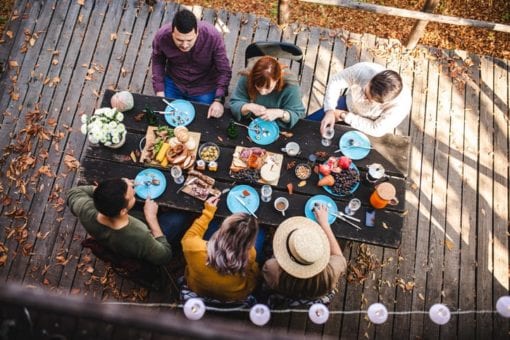Updated on 10/26/23
Many see Thanksgiving as a way of connecting with family by coming together and enjoying a traditional Thanksgiving meal. However, when struggling with an eating disorder, Thanksgiving can also mean feeling overwhelmed and anxious because the holiday focuses on food for celebration.
Here are some tips to help you through the holiday:
1. Treat Thanksgiving Like Any Other Meal
The Thanksgiving meal has often been thought of as a meal to “save up for” and eat past the point of satiety. Contrary to popular belief, Thanksgiving doesn’t have to be this way. When preparing for the day, ensure you are still eating at the appropriate times as decided by you and your treatment team. When deciding what you’re going to have (whether you planned ahead of time, or in the moment), (1) look at what is being offered, (2) take three long breaths and (3) think about what looks appetizing (or doable) to you.
2. Identify Coping Skills to Use Before, During & After Thanksgiving Dinner
Anxiety about spending Thanksgiving with your loved ones can be all-consuming. To ensure Thanksgiving doesn’t pass you by while your thoughts are on your meal plan or the food, come to the gathering equipped with coping methods to help you soothe your emotions and anxiety. Some examples may be:
- Bringing a journal
- Creating a playlist with calming music
- Doing deep breathing techniques
- Going outside with your support person (more on that in our next tip) for some fresh air
- Bringing a grounding stone (or transitional object) to help you stay connected
3. Identify a Support Person for the Meal
Ask someone who will be at the meal (or accessible by phone) ahead of time to support you at the Thanksgiving gathering. Your support person could help distract you from a triggering moment with relatives or help change the subject during an awkward dinner conversation about food or weight. Create a code word to use with your support person so they know when you are feeling triggered or overwhelmed and may need some help.
4. Focus on Gratitude this Thanksgiving
Stay focused on what is good about Thanksgiving. Create a gratitude list, listing all the things and people you are truly grateful for. Bring this list to the Thanksgiving meal to use as a reminder when you find yourself struggling. Sometimes a gratitude list can include things as simple as being grateful for the ability to focus on the breath in your body, the ability to walk, the ability to use your senses of sight, touch, taste and hearing.
5. Take a “Time Out” During the Holiday
Give yourself mini breaks from the stress of the food, possible diet and food talk and triggering conversations. Some ways to do this include going on a short walk with your support person, going into another room for 5-10 minutes to decompress or simply stepping outside and taking a few deep breaths.
6. Be Kind to Yourself
Practice self-care by using your “empowering voice.” This voice is the opposite of your critical voice and is the one that embodies compassion, grace and self-worth. Fostering self-compassion is an empowering process because it allows you to take ownership of your emotions, body and mind.
If you or someone you know is struggling with an eating disorder, reach out to Center for Discovery. We’re here for you—even during Thanksgiving and other approaching holidays—when you need a place to turn.
Contributed by Julia Cassidy, MS, RDN, CEDRS.
More from Center for Discovery:
- Practicing Gratitude in Eating Disorder Recovery
- Returning Home for the Holidays
- Three Ways to Overcome Negative Food Talk During Holiday Gatherings
